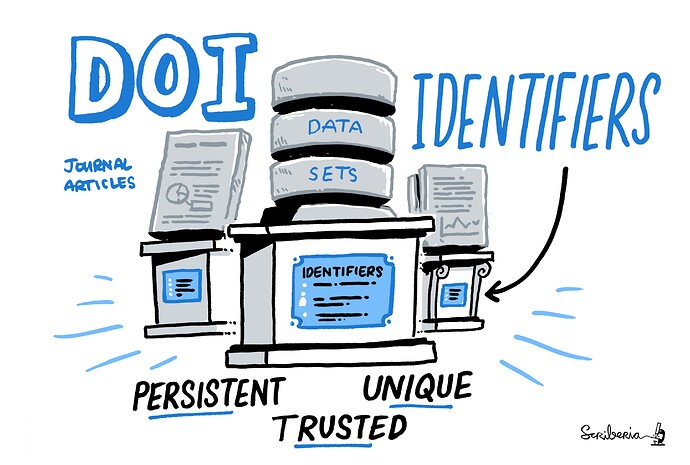What’s the point of PIDs?
Persistent Identifiers (PIDs) are an essential component of research infrastructure. PIDs are critical for building and maintaining reliable and robust links between objects, people, communities and infrastructures. PIDs eliminate ambiguity; the metadata associated with them describes what something is, helps you find it, and lets you know how to use and reuse it.
PIDs are sometimes described as a social security number for a research object. Another analogy which might be helpful when thinking about PIDs is with a statue, unique, long-lasting and robust.
PIDs make research entities such as publications, datasets, researchers and others:
- Discoverable - identifying them uniquely and reliably
- Accessible - resolving to the specific entity reliably and consistently, even if it moves to a new location
- Useable - pointing directly to a particular version of a resource
- Intelligible - exposing the provenance of resources, connecting them, improving accuracy and the flow of information
- Interoperable - providing provenance and transparency, making resources trustworthy
- Assessable - an interconnected network of specifically identified entities
However assigning a unique label does not make something a PID, for the full value of PIDs to be realised they require the associated metadata and services, the agreed standards, and a sustainable community around the PID system which builds assurance and trust. PIDs can only be as persistent as the organizations that provide and support them.
Proper use of PIDs supports:
- Discovery of resources
- Citation and reuse
- Collaboration across facilities, disciplines, institutions, and countries
- Credit - people and facilities can be reliably associated and acknowledged
- Evaluation of impact through citation tracking
- Trust and verification - accurate identification builds trust
- Privacy - accurate identification allows privacy preferences to be supported
- Efficiency and scalability - through increased interoperability
- Innovation
The main benefits of using PIDs vary across different communities - based on the groupings for the Knowledge Hub we have summarised them below.
For researchers the main benefit of PIDs are the discoverability and profile building opportunities offered. It is also easier to gain credits for work undertaken in an unambiguous way.
For librarians and repository managers the longevity and trustworthy nature of PIDs is a large benefit as well as the opportunity of assessment.
For developers PIDs make it easier to interoperate across systems, their trustworthy nature and metadata requirements make this interoperability easier.
For funders and policy makers PIDs make it easier to track research outputs and understand the relationships between researchers and different types of research outputs.
For publishers PIDs improve the trustworthiness of their resources, and provide an interoperable framework across published research.
Updated 23 March 2020 with image and additional content.
